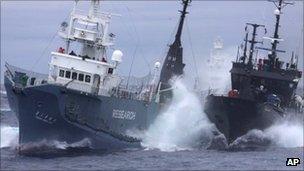New Zealand attacks Japan's decision to resume whaling
- Published

Japan cut short its whaling season last year because of harassment by anti-whaling activists
New Zealand has condemned Japan's decision to resume whaling in Antarctic waters later this year.
The New Zealand government described the seas around Antarctica as its neighbourhood, and called Japan's whaling plans "entirely disrespectful".
Wellington also expressed concern at Japan's plans to increase security to protect its whaling fleet.
Last year Japan cut short its whaling season because of harassment from anti-whaling activists.
Japan's Fisheries Minister Michihiko Kano said on Tuesday that extra ships would escort the fleet to the Antarctic.
'Lives at risk'
There has been a ban on commercial whaling for 25 years, but Japan catches about 1,000 whales each year in what it says is a scientific research programme.
Critics say it is commercial whaling in another guise.
Japan's fleet sails south to the Antarctic in the autumn each year, returning the following spring.
But last year it returned early, citing safety concerns, after confrontations with an anti-whaling activist group that had followed the fleet south.
The group, Sea Shepherd, has pledged to follow the fleet again this year and obstruct its hunt.
In the past there have been collisions between its vessels and the whaling fleet, and its activists have also boarded Japanese vessels.
There had been speculation that the activists' campaign, budget problems in the wake of the 11 March earthquake and tsunami, and new rules at sea might persuade Tokyo to stop whaling.
But Mr Kano said that this was not the case.
"Japan will conduct the research whaling while strengthening measures against acts of sabotage, including dispatching Fisheries Agency escort ships," he said.
New Zealand's Foreign Minister, Murray McCully, expressed alarm at recent statements from Sea Shepherd suggesting its vessels could use life-threatening tactics to stop whalers.
"The New Zealand government has consistently urged all parties to act responsibly during the whaling season, and to avoid actions that may put their lives, or the lives of others, at risk, " Mr McCully said.
- Published13 July 2011
- Published10 July 2011
- Published16 February 2011